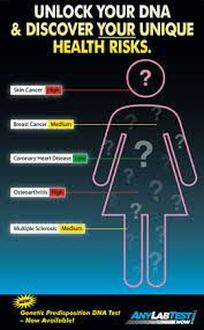 Additionally, medical devices that can be worn are a growing industry and expected to be $8 billion by 2018—because everyone benefits from them. “Caretakers get some much-needed peace of mind that aging family members will always be under a watchful eye; seniors surrender their privacy but, in many cases, hold on to the independence that comes with staying out of assisted-living facilities,” according to the report. DNA tests provide valuable data A growing number of people, perhaps millions, are willing to give up DNA information to discover valuable information about medical predispositions. In 2013 the Federal Drug Administration stopped personal genetics testing service. Currently the government approves targeted, direct-to-consumer genetic test for Bloom Syndrome, which is an inherited disorder that predisposes those with the marker at increased risk for cancer. Genentech is launching a new drug development division, directed at creating new drugs to fight genetic disorders, and have partnered with 23andMe and Pfizer to study Parkinson’s and Lupus. “While the data is anonymous, the research wouldn’t be possible if people hadn’t agreed to expose themselves to technology in new ways—and entrust their most personal health information to a company. 23andMe says 80 percent of its more than 950,000 customers have agreed to donate their DNA information for the purpose of medical research,” they said. Employees wear mobile devices to measure performance Employers are eager to have full surveillance of employees, and the benefits for workers are subtle and in some cases rewarding for those employees who recognize the positive aspects and maximize the benefits. The data collected from employees wearing surveillance devices include relationships with co-workers, job performance, daily habits of exercise and diet—all of which benefit the employer as they seek to improve productivity and cut costs. Employees can benefit as well from workplace monitoring and even substantiate raises and promotions by performance assessments derived from the monitoring. “Wellness programs, too, are emerging with tangible personal benefits: At British Petroleum, U.S. employees who wear company-supplied Fitbits have a chance at lowering their insurance premiums for themselves and their dependents,” according to the report. The logical question for employees is can they trust employers with the information? Some believe a “moral renaissance” in business will dawn a new and improved corporate benevolence driven by ethical management purported by bestselling business consultant Gary Hamel. Proof of this concept will require a track record of trust among participants, which could take years of statistical analysis. In the future giving up privacy will need to be balanced and assessed on a case by case basis to facilitate informed privacy decision making. One thing is certain, however, if a surveillance device or DNA test involves the knowledgeable of a second or even third party of the information, all those participating need to not only be aware of the benefits, but also the risks. Confidentiality guaranteed through contractual methods will become even more important as science and technology become omnipotent in our daily lives. Resource http://www.wired.com/2015/06/3-privacy-tradeoffs-might-worth it
0 Comments
Leave a Reply. |
Dava Castillo
is retired and lives in Clearlake, California. She has three grown
children and one grandson and a Bachelor’s degree in Health Services
Administration from St. Mary’s College in Moraga California. On the
home front Dava enjoys time with her family, reading, gardening, cooking
and sewing. Archives
November 2015
|


